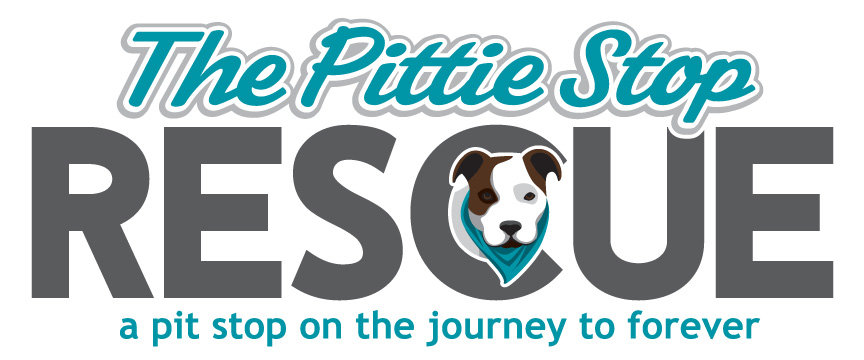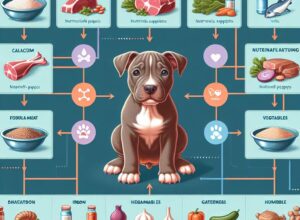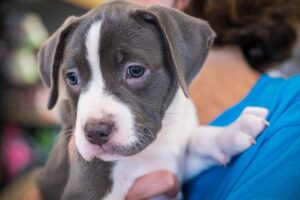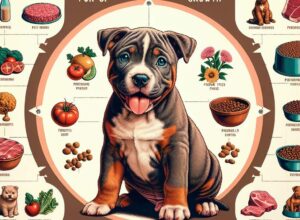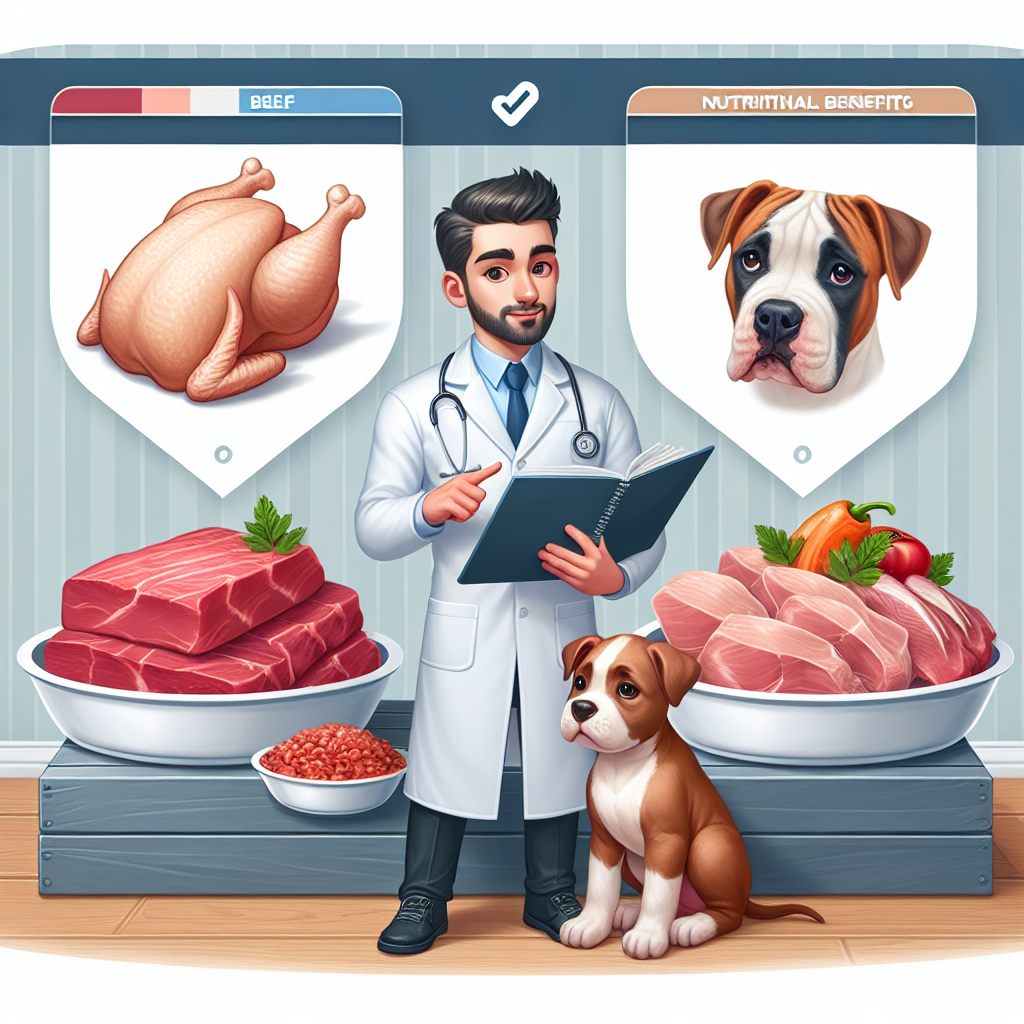
Key Takeaways
-
Understanding E. coli and its risks is crucial for maintaining your Pitbull puppy’s health.
-
Selecting high-quality raw meat and handling it properly minimizes E. coli contamination.
-
Recognizing symptoms of E. coli infection in puppies helps in taking timely action.
-
Adopting good hygiene practices is essential for pet owners to prevent the spread of E. coli.
-
Regular cleaning and disinfecting of your puppy’s eating area is a key preventive measure.
First Line of Defense: Smart Food Choices
The food you choose for your Pitbull puppy is the first line of defense against E. coli. A raw diet can be rich in nutrients and beneficial for your puppy’s growth and health, but it’s vital to select the right type of raw meat and understand the potential risks involved.
Choosing the Right Raw Meat for Your Pitbull Puppy
When it comes to raw diets, not all meats are created equal. To minimize the risk of E. coli, it’s essential to choose high-quality, fresh raw meat from reputable sources. This means avoiding meats that have been left out for too long, as well as those that don’t come with a guarantee of proper handling and safety standards.
Here’s what to look for when selecting raw meat for your Pitbull puppy:
-
Human-grade meat: Opt for meats that are fit for human consumption, as they’re more likely to have been subjected to rigorous safety inspections.
-
Reputable suppliers: Purchase from trusted butchers or suppliers who prioritize animal welfare and cleanliness.
-
Proper packaging: Meat should be well-packaged to avoid cross-contamination with other foods or surfaces.
The Pitfalls of Poor-Quality Raw Diets
Feeding your puppy poor-quality raw meat can have serious consequences. Meat that is not fresh or has been mishandled is more likely to be contaminated with E. coli and other harmful pathogens. This can lead to infections that are not only dangerous for your puppy but can also spread to other pets and humans in your household.
Additionally, a low-quality raw diet may lack essential nutrients, leading to deficiencies and growth problems. Therefore, it’s not just about avoiding bacteria; it’s also about ensuring your Pitbull puppy gets a well-rounded diet that supports their development.
Preparation is Key: Safe Handling of Raw Diets
Once you’ve selected the highest quality raw meat for your Pitbull puppy, the next step is ensuring that it’s prepared safely to prevent any chance of E. coli contamination. It’s all about maintaining cleanliness from the moment you bring the meat into your home until your puppy takes their first bite.
Steps for Contamination-Free Food Preparation
Let’s talk about how to handle raw meat safely. Here are some straightforward steps to keep E. coli at bay:
-
Wash your hands thoroughly with soap and water before and after handling raw meat.
-
Use separate cutting boards and utensils for raw meat to avoid cross-contamination with other foods.
-
Prepare the meat on a clean, disinfected surface and clean it immediately after use.
-
Never leave raw meat at room temperature for too long; it should go from the fridge to preparation to your puppy’s bowl without lingering.
By following these steps, you’re creating a barrier against E. coli and protecting not just your puppy, but your entire family.
Storage Tips to Prevent Bacterial Growth
Proper storage is just as critical as safe preparation. Incorrect storage can turn even the highest quality meat into a breeding ground for E. coli. Keep these tips in mind:
-
Store raw meat at the bottom of the fridge to prevent juices from dripping onto other foods.
-
Keep the meat in airtight containers or sealed plastic bags to contain any potential leakage.
-
Use the meat within a couple of days of purchase, or freeze it immediately for longer storage.
-
Thaw frozen meat in the fridge, not on the countertop, to keep it at a safe temperature during the thawing process.
These storage habits will help ensure that the meat remains as safe and fresh as possible until it’s time for your puppy to enjoy their meal.
Spot the Signs: Recognizing Symptoms of Infection
Being vigilant about your Pitbull puppy’s health means knowing the signs of an E. coli infection. Early detection can make a significant difference in the outcome for your pup.
Common Indicators of E. Coli Infection in Puppies
Keep an eye out for these symptoms that might indicate an E. coli infection:
-
Diarrhea, which may be bloody
-
Vomiting and nausea
-
Lethargy or decreased activity levels
-
Loss of appetite
-
Signs of abdominal pain or discomfort
If you notice any of these symptoms, it’s essential
Steps for Contamination-Free Food Preparation
The journey to a healthy Pitbull puppy starts in your kitchen. Preparing raw meat for your pup isn’t just about dishing it out; it’s about doing so safely to prevent the spread of bacteria like E. coli. Here’s how you can ensure that meal prep is contamination-free.
Begin with a clean slate. Disinfect countertops, cutting boards, and utensils before they come into contact with raw meat. Cross-contamination is a common culprit in spreading bacteria, and this simple step can be a game-changer.
-
Always wash your hands with soap and water before handling raw meat, and repeat after you’re done.
-
Keep raw meat away from other foods, especially those eaten raw. Use separate cutting boards—one strictly for raw meat and another for everything else.
-
Chop and prepare the meat on a sanitized surface. Afterward, clean all surfaces and tools with hot, soapy water followed by a disinfectant.
-
Raw meat shouldn’t be left out. If it’s not being prepped or consumed, it should be stored properly to avoid bacterial growth.
By adopting these practices, you’re not just protecting your puppy; you’re safeguarding your entire household from potential bacterial exposure.
Storage Tips to Prevent Bacterial Growth
Storage is where good intentions can go awry if not done carefully. E. coli loves to multiply at room temperature, so keeping raw meat cold is non-negotiable. Follow these storage tips to keep your puppy’s food safe:
-
Immediately refrigerate or freeze raw meat after purchase. If refrigerated, use it within 1-2 days.
-
Store raw meat in leak-proof containers at the bottom shelf of the fridge to prevent cross-contamination.
-
For longer storage, freeze the meat in portion-sized, airtight bags or containers.
-
Thaw frozen meat in the refrigerator, not on the counter, to keep it at a safe temperature.
Sticking to these guidelines will help ensure the meat remains fresh and less likely to harbor harmful bacteria.
Your Role in Prevention: Hygiene Practices for Owners
Your habits play a significant role in preventing E. coli infections. Good hygiene practices are your armor in this battle for your Pitbull puppy’s health.
Proper Handwashing: A Must for Pet Owners
Handwashing is a simple yet powerful tool. Wash your hands with soap and water for at least 20 seconds after handling your puppy’s food, after cleaning up waste, or after playing with your pet. This isn’t just a suggestion—it’s a must.
Cleaning and Disinfecting Your Puppy’s Eating Area
Your puppy’s eating area should be as clean as your own. After each meal, wash their bowls with hot, soapy water and disinfect the area where they eat. This prevents any lingering bacteria from sticking around and potentially causing problems.
Consistency in these practices is key. Make it a part of your routine, and you’ll be taking proactive steps to keep your puppy, and everyone else in your home, safe from E. coli.
Why E. Coli in Your Pitbull Puppy’s Diet Should Concern You
As a pet owner, the health of your Pitbull puppy is likely at the forefront of your mind. You’ve probably heard about the potential risks associated with E. coli, especially if you’re considering or already feeding a raw diet. But what exactly is E. coli, and why is it a concern for your furry friend? Let’s dive into what this means for your puppy’s diet and overall well-being.
What is E. Coli and Why It’s a Threat
E. coli, short for Escherichia coli, is a type of bacteria that can be found in the environment, foods, and intestines of people and animals. While many strains of E. coli are harmless, others can cause serious illness. In puppies, particularly young and vulnerable Pitbulls, certain strains can lead to severe health issues, including diarrhea, urinary tract infections, and even kidney failure.
The threat lies in the fact that E. coli can be present in raw meat, which is a popular choice for many pet owners seeking a natural diet for their dogs. If the meat is contaminated and not handled correctly, it can pose a significant risk to both your puppy and your family. This is why it’s crucial to understand how to minimize these risks and ensure your Pitbull puppy enjoys a safe, nutritious diet.
Health Impacts of E. Coli on Puppies
Your Pitbull puppy is full of energy and curiosity, but an E. coli infection can quickly dampen that spirited nature. Symptoms may include vomiting, lethargy, loss of appetite, and dehydration, all signs that your pup is in distress. In severe cases, E. coli can lead to more serious conditions like hemolytic uremic syndrome, which can cause kidney damage and is potentially life-threatening.
It’s not just about the immediate health concerns, either. E. coli infections can have long-term effects on your puppy’s health, potentially leading to chronic conditions or making them more susceptible to other diseases. Because of this, it’s essential to take proactive steps in minimizing the risk of E. coli in their diet from the start.
Can E. Coli be Completely Avoided in Raw Diets?
The truth is, no diet is completely without risk, and that includes raw diets. E. coli is commonly found in the environment and can be present in raw meats. However, the risk can be significantly reduced with careful selection of meat, proper food handling, and storage practices. It’s about managing and minimizing the risk, not eliminating it entirely. By staying vigilant and informed, you can make a raw diet as safe as possible for your Pitbull puppy.
How Often Should I Clean My Puppy’s Eating Area?
Think of your puppy’s eating area like your own kitchen table. You wouldn’t eat from a dirty plate, and neither should your puppy. It’s best to clean and disinfect their eating space after every meal. This includes washing their food and water bowls with hot, soapy water. Regular cleaning will help prevent the buildup of bacteria like E. coli and keep your puppy’s dining area safe and sanitary.
What If My Puppy Shows Symptoms of E. Coli Infection?
If you suspect that your Pitbull puppy has contracted an E. coli infection, it’s critical to act swiftly. Watch for symptoms like diarrhea, vomiting, lethargy, or a decrease in appetite. If you notice these signs, contact your veterinarian immediately. They will guide you on the necessary steps, which may include collecting a stool sample or starting treatment. Quick action can help ensure the best outcome for your pup.
Are Some Breeds More Susceptible to E. Coli Infection?
While any dog can potentially contract an E. coli infection, puppies, senior dogs, and those with weakened immune systems are at greater risk. Specific breed susceptibility to E. coli isn’t well-documented, but due to their robust nature, Pitbull puppies may not be more susceptible than other breeds. Still, their young age makes it crucial to take preventive measures seriously.
Can Human Family Members Get E. Coli From Handling Raw Puppy Food?
Yes, it’s possible. E. coli can be transmitted to humans through handling contaminated raw food or coming into contact with an infected dog’s feces. This is why it’s essential to maintain good hygiene when preparing your puppy’s meals and to wash your hands thoroughly afterward. Additionally, ensure that children and other vulnerable family members avoid contact with raw pet food and your puppy’s waste.
To wrap it up, keeping your Pitbull puppy safe from E. coli involves a combination of smart food choices, meticulous preparation and storage, and strict hygiene practices. It’s about creating a safe environment where your puppy can thrive and grow without the looming threat of bacterial infection. And remember, if you’re ever in doubt about your puppy’s health or diet, your vet is your best resource for tailored advice and support.
